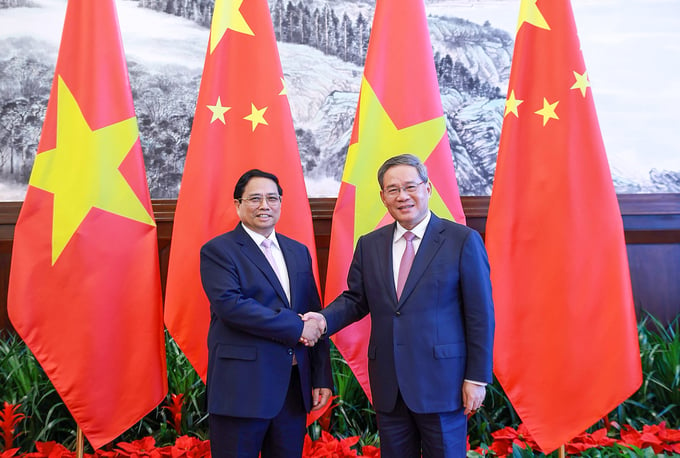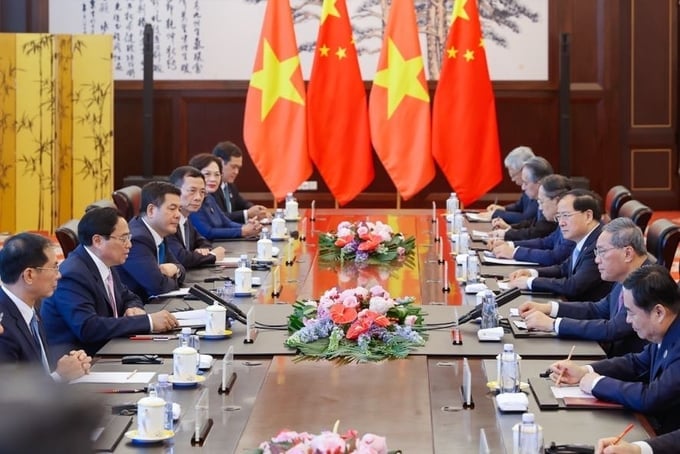May 24, 2025 | 16:22 GMT +7
May 24, 2025 | 16:22 GMT +7
Hotline: 0913.378.918
May 24, 2025 | 16:22 GMT +7
Hotline: 0913.378.918

Prime Minister Pham Minh Chinh engaged in discussions with Premier Li Qiang of the State Council of the People's Republic of China on the afternoon of June 24, in Dalian, Liaoning province. Photo: VGP.
During the discussion, the two Prime Ministers reported on the status of their respective Parties and countries; they engaged in comprehensive exchanges on the recent relations between the two Parties and countries, and reached an agreement on the realization of the high-level outcomes from the historically significant visits made by General Secretary Nguyen Phu Trong in 2022 and General Secretary and President of China Xi Jinping in 2023. Additionally, both countries aim to promote the Vietnam-China Comprehensive Strategic Cooperative Partnership and the Vietnam-China Community of Shared Future to achieve substantial, effective, and practical results, with preparation for the 75th anniversary of the establishment of diplomatic relations between Vietnam and China.
After reflecting on the achievements of their cooperation over the years, the two Prime Ministers agreed that the relations between the two Parties and countries have made historic progress, with several highlights, including: strengthened political trust; numerous new cooperation mechanisms in critical fields; promoted strategic and transportation connectivity; impressive growth in trade cooperation; increased investment from China into Vietnam; exceptional recovery in the tourism sector; and active local, people-to-people exchanges.
Prime Minister Pham Minh Chinh affirmed that Vietnam views the development of relations with China as an objective requirement, a strategic choice, and a priority in its independent, self-reliant, multilateral, and diversified foreign policy.
Premier Li Qiang emphasized that China regards Vietnam as a priority in its overall neighboring diplomatic policy, and supports Vietnam in successfully pursuing its industrialization and modernization efforts, as well as enhancing its international role.
Both countries agreed to effectively implement the Vietnam-China Joint Statement on further strengthening, elevating their Comprehensive Strategic Cooperative Partnership, and building the strategically significant Vietnam-China Community of Shared Future in accordance with the "Six Plus" direction; maintaining high-level exchanges and contacts across all levels of government; strengthening inter-Party exchanges and cooperation between the two governments, National Assemblies, and the Front/Consultative bodies of both countries.
Additionally, Vietnam and China agreed to expand cooperation in key areas, including diplomacy, defense, and security; enhance practical cooperation across various sectors and friendly exchanges between local governments and mass organizations; establish a peaceful, stable, cooperative, and developing land border; manage disputes and maintain peace, stability at sea; and promote coordination in international and regional forums.

The two Prime Ministers agreed that the relations between the two Parties and countries have made historic progress, achieving numerous significant results with outstanding highlights. Photo: VGP.
Prime Minister Pham Minh Chinh emphasized the need for Vietnam and China to continuously innovate and formulate creative measures; effectively implement high-level agreements; enhance strategic connectivity. On the other hand, Prime Minister Pham Minh Chinh proposed both countries to facilitate transportation infrastructure connectivity, with a focus on promoting the construction of the Lao Cai - Hanoi - Hai Phong, Lang Son - Hanoi, and Mong Cai - Ha Long - Hai Phong standard gauge railway lines with appropriate schedules.
The Prime Minister also highlighted the need for both countries to promptly sign a protocol and complete the procedures in order to open the market for Vietnamese frozen durian and fresh coconut; facilitate market access for other agricultural and aquatic products, citrus fruits, avocados, custard apples, water apples, passion fruit, livestock, and poultry; and support the establishment of Vietnam Trade Promotion Offices in Chengdu (Sichuan), Haikou (Hainan), and Nanjing (Jiangsu).
Furthermore, Vietnam and China must discuss measures to improve customs clearance efficiency, upgrade border gate infrastructure; promote the construction of smart border gates; coordinate to resolve outstanding issues in select cooperation projects; and expedite the implementation of China's non-refundable aid for Vietnam.
Prime Minister Pham Minh Chinh proposed enhancing cooperation in agriculture, finance and banking, science and technology, education, culture, and tourism, with a focus on digital transformation, green growth, and high-tech agriculture; developing plans and timelines for the official operation of the Ban Gioc (Vietnam) - Detian (China) Waterfall Scenic Area. He also requested China to promptly implement 1,000 scholarships for Vietnamese Chinese language teachers.
In agreement with Prime Minister Pham Minh Chinh's cooperation proposals, Premier Li Qiang affirmed China's readiness to strengthen its practical cooperation efforts with Vietnam and to promote the development of the Vietnam-China Comprehensive Strategic Cooperative Partnership in the "Six Plus" direction.
Premier Li Qiang stated that China will further open its market to Vietnamese goods, with an emphasis on high-quality agricultural, aquatic products, and fruits; coordinate to facilitate quarantine and customs clearance; and support the resolution of institutional and policy obstacles in order to promote sustainable growth as well as new achievements in bilateral trade relations. He also proposed the enhancement of strategic connectivity, especially in infrastructure and transportation.
Additionally, both parties agreed to promote economic-trade and investment cooperation, particularly in manufacturing, agriculture, supply chain maintenance, and vocational training; expand financial and monetary cooperation; and enhance practical cooperation in accordance with the new level of bilateral relations between the two Parties and countries.
The two leaders held comprehensive exchanges on maritime issues, affirming the importance of managing differences and maintaining peace, stability in the East Sea.
Prime Minister Pham Minh Chinh proposed that Vietnam and China to strictly implement the "Agreement on Basic Principles for the Settlement of Maritime Issues between Vietnam and China"; respect international law, with an emphasis on the 1982 United Nations Convention on the Law of the Sea (UNCLOS); respect each other's legitimate rights and interests; utilize negotiation mechanisms on maritime issues; appropriately address issues involving fishing vessel or fishermen; and effectively manage maritime issues.
The two Prime Ministers also discussed various international and regional issues of mutual concern, and agreed to maintain coordination, cooperation in regional and international forums.
Prime Minister Pham Minh Chinh reaffirmed Vietnam's consistent policy of adhering to the "One China" policy, supporting China's active role in the region and the world. He further proposed both countries to enhance coordination and cooperation in regional and international forums, especially within the frameworks of WTO, APEC, ASEM, and ASEAN.
Translated by Nguyen Hai Long

(VAN) In the tranquil wetlands of Van Long, there are quiet souls who guard the forests, nurture the waters, and oversee every bird and troop of langurs as protecting the essence of a living heritage.

(VAN) WWF, GIZ, IUCN, UNDP call for biodiversity conservation and sustainable development must be regarded as a unity in strategies for a green future.

(VAN) On celebration of International Day for Biological Diversity, Deputy Minister Nguyen Quoc Tri called for practical actions to address nature and biodiversity conservation.

(VAN) Dr. Hoang Thi Thanh Nhan – Deputy Director of the Nature and Biodiversity Conservation Agency – highlighted this on the International Day for Biological Diversity, May 22, 2025.
![Ho Chi Minh city adapts to climate change: [2] Accelerating action](https://t.ex-cdn.com/nongnghiepmoitruong.vn/608w/files/chiqk/2025/05/22/4024-4220-bien-doi-khi-hau-1-100626_766.jpg)
(VAN) Clearly recognizing the challenges posed by climate change, Ho Chi Minh city has swiftly shaped its policies and implemented practical solutions to adapt.

(VAN) Rice straw is no longer just a discarded byproduct, but it is becoming a green resource that helps farmers in the Mekong Delta reduce emissions and promote circular, sustainable agriculture.

(VAN) Other Effective Area-based Conservation Measures (OECMs) are solutions that contribute effectively to achieving the goals of the Kunming–Montreal Global Biodiversity Framework.